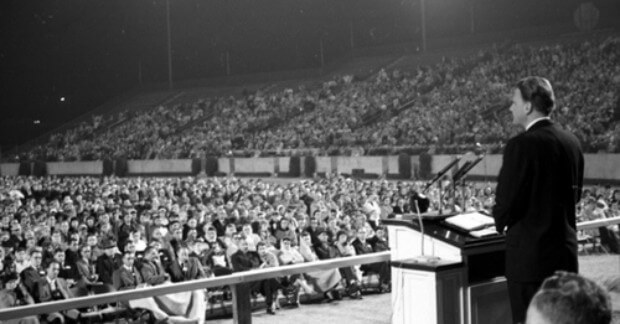Billy Graham, a titan of evangelism and possibly the most well-known evangelical pastor of the 20th century, passed from this life to his reward last week.
While many will rightly mention his crusades, his relationships with many U.S. presidents, or his friendship with Martin Luther King, Jr., most probably do not remember the surprising time Billy Graham lectured a group in Silicon Valley about the future, death, technology, and God.
It was 1998, and Graham was speaking at the annual TED Talk conference at Monterey, California. Why Richard Wurman, founder of the conference, had invited Graham is anyone’s guess. Some thought he was parading out a “clown preacher” to fulfill a quota on religious speakers. Whatever the case, Graham had accepted the invitation, and he stood before the young frontiersmen of the internet era.
“You can imagine how out of place I feel,” Graham opened. “I feel like a fish out of water.” Graham knew that his audience was probably either uninterested or outright hostile to his brand of Christianity. Rather than begin his talk by launching into a “call for a decision,” he disarmed his audience with self-deprecating humor and references to the great technological advances of the 20th century. He then pondered why technology wasn’t making us better people:
Have you ever thought about what a contradiction we are? On one hand, we can probe the deepest secrets of the universe and dramatically push back the frontiers of technology, as this conference vividly demonstrates. We’ve seen under the sea, three miles down, or galaxies hundreds of billions of years out in the future.
But on the other hand, something is wrong. Our battleships, our soldiers, are on a frontier now, almost ready to go to war with Iraq. Now, what causes this? Why do we have these wars in every generation, and in every part of the world? And revolutions?
We can’t get along with other people, even in our own families. We find ourselves in the paralyzing grip of self-destructive habits we can’t break. Racism and injustice and violence sweep our world, bringing a tragic harvest of heartache and death. Even the most sophisticated among us seem powerless to break this cycle. I would like to see Oracle take up that, or some other technological geniuses work on this. How do we change man so that he doesn’t lie and cheat and our newspapers are not filled with stories of fraud in business or labor or athletics or wherever?
By the end of his talk, he had given them an answer. Pointing to Pascal, Paul, and ultimately to Jesus Christ, Graham had outlined the solution to human sinfulness.
I don’t want to spoil the power of Graham’s argument, so I recommend that you watch the talk for yourself. Graham shows winsomely and convincingly, as he always did, how Jesus Christ was the answer to all of life’s problems. Hopefully this message, given 20 years before his death, will inspire you to go out and speak courageously from your own platform about “the Way, the Truth, and the Life.”





